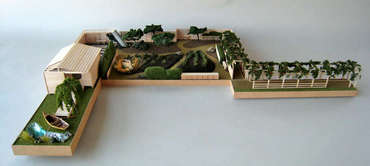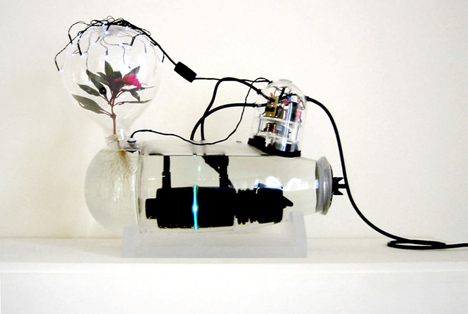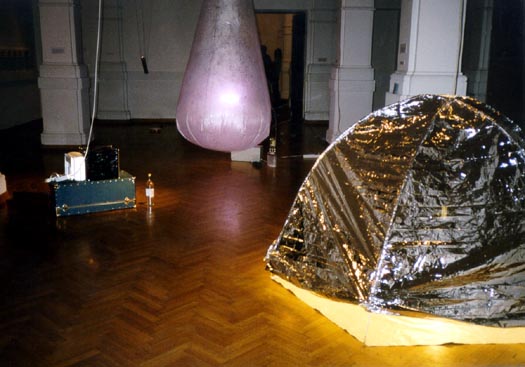VIRALNET
We'd like to start the conversation discussing your project "Machine in the Garden".... give us a quick overview of your ideas for the project.
PHIL
I got together with my friend Marina McDougall a few years back to talk about our love for gardens. We worked on various projects together, we read up on garden history and theory, and eventually we were invited by the Oxbow School to build a garden on their site in the Nappa Valley. We were inspired by Leo Marx's book 'Machine in the Garden' and wanted to create an allegorical experience around the transformation of the land in relationship to mechanization.

VIRALNET
When we started Home and Garden the issue of domesticity was one of our main interests to pursue. Landscape Architecture and gardening involves an imposition of design over space, so to speak. This seems to stem from the Baroque principles of the French Garden and Andre LeNotre. There is a sense of colonialism towards nature at work with LeNotre, taming the wild and domesticating nature so as to dominate it and impose a narrative of social order, power and private privilege. LeNotre transforms nature from a shared commons to a private possession, specifically in opposition to a non-colonized wild space. So how do these issues of domesticity, design and colonialism frame your intent for the transformation and mechanization of the land?
PHIL
I looooooove Andre LeNotre. Before I read up on the design of Versailles, the aesthetics of the Baroque period would freak me out quite a bit—all those control systems, manicured trees, mirror pools and Greek mythological references. We have incorporated so many of the concepts from the land of the Sun King, to the point that we consider them a part of our own (hyper) naturalized landscape.
With the Oxbow garden we are trying to deliver a romantic vision of nature, while at the same time show how much engineering and aritifice it requires to produce this kind of visionary experience. I have come to prefer my artifice unvarnished, or without the pretense of aspiring to a naturalized state. The English countryside is just as artificial, but it's based on the idea of the Italian countryside as envisioned in painting of the 17th century. I always used to love those meadows and fields, with the occasional tree and clump of bushes. but that is all planned; a reflection of a fantasy that never existed.
VIRALNET
In a sense your garden is an 'in-between' space—neither completely natural nor completely man-made. It also functions as an interface for a certain type of experience...ecological yet 'mechanized' by its architecture.
PHIL
I like to think of the garden as a cultural manifold, where things are harbored and distributed out from inside its protective walls. It is the place adjacent to the domestic realm, the room outside, and in that intermediate space ideas and practices can begin to leave the incubator of home life and begin to work out towards the greater culture. I feel that it works in the opposite direction as well, where things are kept to become tame before enetering inside. Ideas of medicine, love, ethics, so many ideas have started within the walled space of the garden. The walls are also quite critical, a defining line.
The garden is also the basis for the word 'paradise,' and it might seem strange, again, that we would think of somehing constrictive as being a form of paradise, but maybe it goes back ot those conflicted feelings we have about Versailles.
VIRALNET
The word 'paradise' carries with it a presumption of innocence...however the only 'paradise' is one that is lost...is it possible to construct a space based on 'protective walls' and not imply colonialism?
PHIL
Gardens are harsh places. The weeds get pulled, some things get water, others don't, growth is managed and limited.
I'm thinking about Leo Marx and his notion of the 'pastoral ideal'...that immediately brings to mind the unreachable goal of control—it seems that we are constantly trying to keep the weeds out.
I like the idea of laissez faire gardens, where you let things go. I have done this in some experiments, but still there is always some sense of an author's presence. As the tender or culture dies, there is nothing left but a slight depression in the earth. the diffuse liminal region between care and control extends to so many of our ideas about culture.
VIRALNET
The idea of 'care and control' extends to your mushrooms...
PHIL
Veeeeeeeeeery much so. Working with mushrooms is a great education in control systems. In terms of artifice, I can't imagine a more explicite example. You have to consider the control of the invisible, maintaining the purity of the air and all surfaces to be free of 'corrupting forces.'
when I was growing them I had to be there all the time, not doing so much for the mushrooms exactly, but maintaining the space they live in.
'Corrupting forces' can also be found in all endeavors that are framed within an art context. What is allowed into the domain of the idea, what is cultivated through material manipulation and what is allowed to 'grow'...
It also made me become aware of my own behaviours, and how these can have a profound effect on the immediate environment. This is when I started to think about the technique that is at the root of technology.
I have returned to Smithson's "Sedimentation of the Mind" quite a few times, to consider that idea of what one allows to grow in oneself.
VIRALNET
Talk a little more about the 'root of technology' and what one allows to 'grow'—there is a conundrum that begs an answer to 'what is man-made or hand-made?'
PHIL
When i read Heideger's take on technology, with his explication on the idea of techne, which is a methodolgoy of the world as it reveals itself to us. It is a way of revealing how we behave socially in relation to our artifacts. First though there is the way we relate to the artifacts of our minds, as well as the artifacts of our culture. Growth is inevitable, amoral, and often without direction. It it the pruning, direction and allowances that give growth meaning in the anthropic realm.
With the mushrooms I never really touched the material with my own body. I might have given them some kind of infection. I was manipulationg them at a distance by altering their environment: light, temperature, humidity, etc. these were the ways i was 'touching' my material.
This is also the way in which we practice microbiology. Materials are organized and manipulted by an outside observer with tools that are too small to see, smell or touch.
VIRALNET
Pamela Lee says in her book 'Object to Be Destroyed' that "the sublime is not so much the province of aesthetics as of ethics..." Is there a question of ethics when it comes to the intervention of the natural world and the garden's contribution to the ideology of progress?
PHIL
I'm down with Pam on that. Aesthetics are so transient. Yesterday's glorious original Louis XIVth chair is now an antique, today's monster kitsch nightmare. The aesthetics are the same, but the perception is different. Gardens are an intensive realm of ethics, with order, rules, carefully priced pleasures, and release within bounds. As far as the ideology of progress goes, I think that it is best told in the form of a zoo.
I have thought that the best example of the human zoo is a space ship. The height of progress—Juggernaut is a space ship, a space ship for plants.

Juggernaut-2004 24"x36"x10"
The space that Juggernaut is exploring is human space.
During the Victorian era, the gem of the garden example was the crystal palace, which became the template for space ships, shopping malls, and Vegas...and Bucky domes—controlled interiors to match the control fo the exterior. Back to your colonial offer...and....a huge tool in the use of colonized living resources.
VIRALNET
I think your work really points out the paradox that Pamela Lee is referring to in her comment about the sublime... the tension between the imagination and reason- without resorting to a utopian cliche. "heaven is a place where nothing ever happens..."
PHIL
It is strange that we have advanced from an idea of stasis as hell to stasis as utopia. I think that Darwin's protean synthesis of material and time has had a lot to do with this. It's still a very big problem to imagine that the world is never the same twice.
VIRALNET
Is this the point of 'Discovered Order'?

PHIL
The conditions were there but nothing ever happened. I wanted to propose some 'perfect spaces', spaces of potential but absent of any real dynamism. site unspecific works. They destroyed or obviated the unique qualities of the local environment for the idea of an interior that can be replicated anywhere. All you need is electricity to make them work.
VIRALNET
An anti-garden?
PHIL
Yes. They begged for a human participant to add something to them.
There are many fantasies of nature without humans, an idea of the earth without our meddling ways. This feels a bit self-hating.
VIRALNET
But at the same time—the invisible is very much part of our fantasies of nature—let's jump into the microscopic and talk about your interest in visualizing molecules.
The process of visualization seems almost one of pure fantasy. Fantasy as Webster defines it is "a creation of the imaginative faculty whether expressed or merely conceived."
PHIL
Very much so. This evolved out of my interest in the techniques of the body in relation to growing a particular aspect of the world. Behaviour makes mushrooms and plants grow, selection, choice, etc. What does one think one is doing when these actions take place.
We are of the invisble. Our thoughts are invisible, until carried out and into some type of action in the world.
VIRALNET
And that action is best described through dance?
PHIL
It is also a mythic world, and open to so many things.
I don't use the word 'dance,' cause that tends to scare off the dudes. I say 'movement.' However movement is also not quite right.
So yes, it is a form of dance.
It was inspired by the movie ' a Protein Primer' which some of Paul Berg's grad student's made in the early seventies.
The first time I saw it, it blew my mind. I have had an itch for over ten years to do something in response to this movie. I tried to figure out a way to make the molecular real in the world of the senses.
It could also be a song, or some other performative event in time. I just enjoy dance more than programming computer animation.
The movie is called 'tRNA!' and it feels a bit goofy now, but it was very much reflective of the tastes and feelings of its time. There is something so great in manifesting ones body as the spirit of which it is composed. Proteins and DNA in this instance.
VIRALNET
Many indigenous peoples can 'sing' their world into existence...dance to is a ritual that describes relationships of the divine to nature- do you propose we allow the myth back into our cosmology?
PHIL
I don't think it ever left. If you define myth as awe inspiring or heroic. We use math and symbols as these are the most elegant and precise way of describing our world. But as far as our understanding, myth has never left. If a culture uses the idea of a frog spirit to describe a quality of the world, it can still be a very accurate mode of description.
Dance is supremely social, as are molecules, and it is relatively easy to understand atomic interactions through simple rules and behaviors—much more than through a diagram or mathematical equation for most folks.
VIRALNET
Interactions and simple rules are at the core of much of the 1960s conceptual project... which your work tends to reflect—as well as Pamela Lee's comment on the sublime. The 'aura' may have left the realm of the retinal only to resurface in the social and in nature.
You said it best when you stated that the inquiry of Molecumersion is both the galactic and the microscopic. It all has to do with scale, the sublime then is experienced in action rather than though perception or inference.
PHIL
Maybe when AR(augmented reality) is here in full force we will also have serious questions about the aura of our simple social interacitons, but at this point it feels like it is still a part of the world that is open to the veracity of its affect.
I touch you. You felt it.
This is in part a reacton to this loss of scale, trying to figure out how we act without the usual referances.
Historically, every time we have opened up the diminutive, we have lost an aspect of our balance or relationships, wether it is visual, architectural, cultural.
VIRALNET
Again—we can only perceive with the faculties at our disposal—we marvel at what we imagine...the spaces and worlds that exist beyond our boundaries—psychological, architectural and cultural...the more we're alienated from nature the more we grow desirous and nostalgic for it. The loss of balance, as you say.
PHIL
'Actions' seem to bring us back in touch with ourselves.
We still can feel some internal balance, even if it is only to the center of the earth.
It is a dynamic equillibrium, to borrow from physics.
We always have to reinvent this relationship. I used to be much more alienated from nature until I realized there are so many avenues for its recreation—food, dance, ritual, architecture.
These are actually pretty typical responses to finding some alignment in the world.
VIRALNET
Which brings us back to Versailles—the architects worked with alignment and perspective for the purpose of creating the illusion of greater distance—and one can say greater power. But you're bringing it all back to the personal—where we can align ourselves to our world.
PHIL
The atom is like the chateau—just an element in a much larger garden....
Versailles had so much investment of energy and materials to create the illusion of a an infinitley ordered world. There is not much room there for creative destruction. Vico imagined this state of affairs, with the individual being ordered according to their own personality. (The Michael Jackson effect.) I hope my projects don't get that egoistic.
I have not considered where this dance of the molecules would take place. I have some fantasies of performing it at a football half time show. This goes into Matthew Barney territory, but i think it will be a bit different.
VIRLANET
Like the prisoners in 'Thriller' dancing in the jail yard in the Phillipines...
PHIL
Talk about control systems. Now if we could only have them perform at Versailles, then the universe could come to a peaceful end.